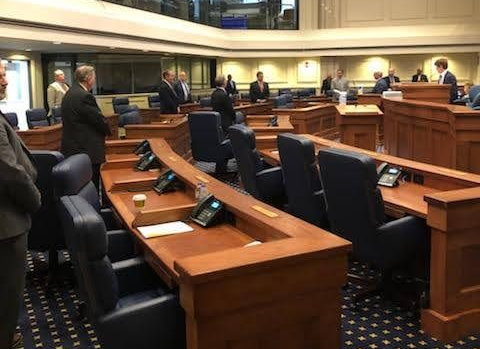Multiple lawsuits filed against Alabama officials over systemic discrimination of children with disabilities

Multiple lawsuits were filed yesterday in the United States District Court for the Middle District of Alabama against Nancy Buckner, Commissioner of the Alabama Department of Human Resources, and Eric Mackey, State Superintendent of the Alabama Department of Education, claiming flagrant violations of the Americans with Disabilities Act (ADA). Six federal lawsuits were filed yesterday on behalf of children placed in residential treatment facilities in Alabama. The lawsuits allege children with disabilities in these facilities are discriminated against by segregating them in on-site “schools,” denying them educational opportunities equal to their non-disabled peers in regular education settings. A recent probe by the Department of Justice (DOJ) uncovered evidence of the State of Alabama’s systemic discriminatory practices, revealing blatant violations of the ADA. The allegations in these lawsuits are consistent with the DOJ’s findings, highlighting the fact that these children are deprived of meaningful interaction with their non-disabled peers, and they also receive inferior instruction, limited resources, and inadequate support. Birmingham Attorneys Tommy James of Tommy James Law and Jeremy Knowles of Morris Haynes, and Pensacola Attorney Caleb Cunningham of Levin Papantonio Rafferty (pictured above, left to right) represent the plaintiffs. They also represent numerous victims from across Alabama who have suffered physical and sexual abuse in these facilities. “The Department of Justice’s findings are deeply troubling and underscore the need for immediate action to ensure our most vulnerable have equal access to education,” James said. “It is inexcusable state officials have ignored and been complicit in such systemic segregation and discrimination. The DOJ’s revelations are not only concerning—they are damning. Every child, irrespective of disability, is entitled to equal educational opportunities.” “We have filed these lawsuits not only for our clients but for every child in the state who has been robbed of the education they deserve,” Cunningham said. “Our goal is to shine a spotlight on this blatant discrimination and to ensure it does not continue. We are committed to fighting for the rights of children with disabilities and ensuring they have the same opportunities as their non-disabled peers.” “These cases are about the fundamental rights of children with disabilities in our state,” said Jeremy Knowles. “We filed these lawsuits to force the state to stop discriminating against these children. They deserve equal opportunity, especially in education.” The lawsuits seek, among other things, compensatory damages, attorneys’ fees, and costs, emphasizing the severe educational, financial, and social damages suffered by the plaintiffs and countless other children due to these discriminatory practices. “With this legal action, we hope to bring attention to the dire need for reform and establish a precedent ensuring equal education rights for children with disabilities across Alabama and the nation,” James said. “We are confident we will prevail in these lawsuits, and the State of Alabama will be forced to change its discriminatory practices.” James says he and his co-counsel filed these lawsuits and plan to file dozens more to hold the State of Alabama accountable for its discriminatory practices and to ensure no child is denied an equal education because of their disability. In an October 2022 press release, Assistant AG Kristen Clarke stated, “Students with disabilities in Alabama’s foster care system are among the most vulnerable in the state’s care, and they deserve better than placement in segregated and inferior schools. The Civil Rights Division will defend every child’s right to equal educational opportunities in schools where they can be supported and challenged.”
Adoption bill passes Senate with vaccination amendment attached

On Thursday, the Alabama Senate passed legislation simplifying Alabama’s complex adoption laws, speeding up the process of children finding permanent homes. The Senate included an amendment that would allow families with vaccine skepticism to be able to be involved in the foster care program. House Bill 101 is sponsored by State Rep. Ginny Shaver. The adoption reform legislation was carried in the Alabama Senate by State Senator Arthur Orr. “This is a Law Institute (ALI) bill,” Shaver said when the bill was in committee. “I started working on a bill and found out that they already had a committee working on rewriting the state’s adoption code.” Shaver explained that the Alabama Law Institute had a committee of judges and lawyers who met on a conference call every two weeks for the last four years to modernize and improve Alabama’s existing adoption statutes. “Alabama’s adoption law has not been touched in 30 years,” Shaver said. The rewritten 80-page bill “is very comprehensive and detailed.” Shaver said that the new legislation divided minor adoptions versus adult adoptions. It also clarifies which court is the proper court, allows courts handling adoptions to work together and communicate, allows for electronic communication, provides rules for a contest of adoptions in certain situations, and clarifies procedures about relatives and stepparents who adopt a minor. Orr did add some amendments in the Senate. The first was a “technical amendment” and came from ALI and Shaver. “This came from ALI and Rep. Shaver, the sponsor,” Orr explained. “It cleaned up some wording about grandparents.” The second amendment deals with vaccinations and was negotiated by Orr with the Alabama Department of Human Resources (DHR). “I spent a good while talking to Commissioner [Nancy] Buckner, and she and the Department support this,” Orr said. “It is not the same amendment that was offered in the House that there was some controversy about.” “The Department of Human Resources shall provide by rule the process through which an individual seeking to participate in foster care or adoption may apply for an exemption from any vaccination requirement for religious or other appropriate reason for himself, herself, or any other individual in his or her household.” The Senate adopted both of the amendments. “This has been a long time coming,” Orr said of the legislation. “We will move children more rapidly through the process of adoption and will remove needless hurdles.” Sen Rodger Smitherman said, “I want to commend ALI. ALI is a collection of legal minds from all over the state.” “I am on the ALI board of directors, so I got to see the committee work on this,” Smitherman said. Orr said that the legislation has “lots of changes” to Alabama’s adoption laws “that will certainly expedite the process.” “I would like to thank DHR. They have a lot of challenges,” Orr said. The Senate voted to pass HB101 30 to 0. The legislation now goes back to the Alabama House of Representatives for them to consider the changes that were made by the Senate. The Legislature will return on Tuesday for the 11th legislative day of the 2023 Alabama Regular Legislative Session. To connect with the author of this story or to comment, email brandonmreporter@gmail.com.
Summer food benefits OK’d for 530K Alabama children

An estimated 530,000 Alabama children who get free or reduced-price school meals are now eligible for food benefits this summer after the school year ends, officials said Tuesday. The Alabama Department of Human Resources said qualifying households will get $120 for each participating student to buy food that is eligible for the Supplemental Nutrition Assistance Program at stores that accept Electronic Benefit Transfer cards. The Summer Pandemic EBT program benefits are expected to begin rolling out in mid-to-late summer. “Inflation has transformed each grocery trip into a balancing act for low-income families struggling to afford food for their children on top of other costs like housing and transportation,” said Alabama Department of Human Resources Commissioner Nancy Buckner in a news release. “Every dollar of support from programs like P-EBT strengthens their spending power and weakens the prospect of hunger while promoting nutritious meals for children.” Summer P-EBT benefits are limited to students who receive free or reduced-price meals under the National School Lunch Program. To become eligible, families may apply by contacting their schools. Applications must be approved by May 16 to qualify for summer benefits. Households with eligible students who received P-EBT benefits previously will access Summer P-EBT benefits on their existing EBT cards. Those who are new to the National School Lunch Program will get EBT cards in the mail. Republished with the permission of The Associated Press.


